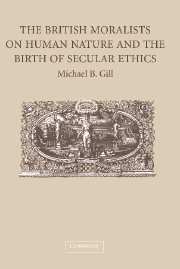Book contents
- Frontmatter
- Contents
- Introduction
- PART ONE WHICHCOTE AND CUDWORTH
- PART TWO SHAFTESBURY
- PART THREE HUTCHESON
- PART FOUR DAVID HUME
- 15 David Hume's New “Science of Man”
- 16 Hume's Arguments against Moral Rationalism
- 17 Hume's Associative Moral Sentiments
- 18 Hume's Progressive View of Human Nature
- 19 Comparison and Contingency in Hume's Account of Morality
- 20 What Is a Humean Account, and What Difference Does It Make?
- Notes
- Bibliography
- Index
17 - Hume's Associative Moral Sentiments
Published online by Cambridge University Press: 29 July 2009
- Frontmatter
- Contents
- Introduction
- PART ONE WHICHCOTE AND CUDWORTH
- PART TWO SHAFTESBURY
- PART THREE HUTCHESON
- PART FOUR DAVID HUME
- 15 David Hume's New “Science of Man”
- 16 Hume's Arguments against Moral Rationalism
- 17 Hume's Associative Moral Sentiments
- 18 Hume's Progressive View of Human Nature
- 19 Comparison and Contingency in Hume's Account of Morality
- 20 What Is a Humean Account, and What Difference Does It Make?
- Notes
- Bibliography
- Index
Summary
The Positive Answer and a Theological Conception of Human Nature
In the seventeenth and eighteenth centuries, the Positive Answer to the Human Nature Question was embedded in theological conceptions of human nature. Cudworth, for instance, held that human rationality was attuned to the eternal and immutable truths of morality and that human rationality derived directly from the mind of God. And Hutcheson held that all of our senses were originally either benevolent or consistent with benevolence and that all our senses were originally implanted by God.
This combination of the Positive Answer and a theological conception of human nature went hand in hand with a certain view of justification. According to this view, something is justified if it is based on an aspect of human nature that is innate, instinctive, hard-wired, or unchanged by contingent interactions with the empirical world. Human nature, according to this view, was created by God, and God is perfectly moral. So something based on an original feature of human nature – on a feature that is the same now as it was when God first created it – possesses a pristine pedigree, an unimpeachable provenance. Moral sense theorists such as Hutcheson contended that our original moral affections possessed this status. Rationalists such as Cudworth contended that only reason did. But the structure of justification is the same for both of them. They both hold that justifying something involves tracing it back to what is original to human nature.
- Type
- Chapter
- Information
- Publisher: Cambridge University PressPrint publication year: 2006



